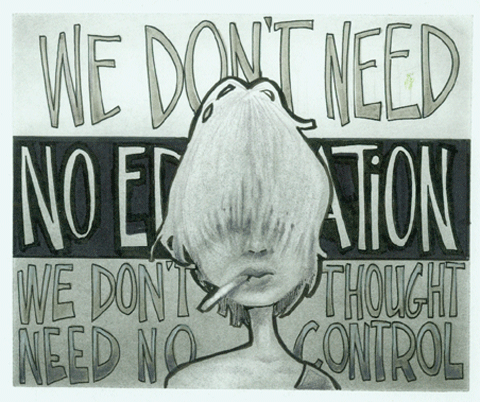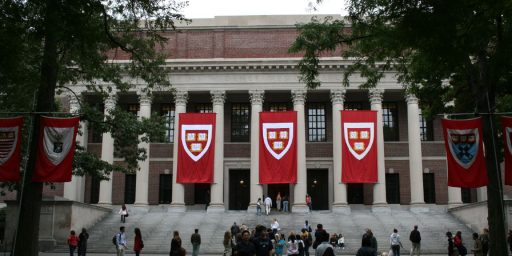Higher Education Bubble: Another Brick in the Wall?
An increasing number of bright observers are questioning the notion that everyone needs to go to college.
Instapundit and Tennessee lawprof Glenn Reynolds has being sounding the alert for a higher education bubble for quite some time now. Now, PayPal founder Peter Thiel is getting on the bandwagon.
“A true bubble is when something is overvalued and intensely believed,” he says. “Education may be the only thing people still believe in in the United States. To question education is really dangerous. It is the absolute taboo. It’s like telling the world there’s no Santa Claus.”
Like the housing bubble, the education bubble is about security and insurance against the future. Both whisper a seductive promise into the ears of worried Americans: Do this and you will be safe. The excesses of both were always excused by a core national belief that no matter what happens in the world, these were the best investments you could make. Housing prices would always go up, and you will always make more money if you are college educated.
Like any good bubble, this belief- while rooted in truth- gets pushed to unhealthy levels. Thiel talks about consumption masquerading as investment during the housing bubble, as people would take out speculative interest-only loans to get a bigger house with a pool and tell themselves they were being frugal and saving for retirement. Similarly, the idea that attending Harvard is all about learning? Yeah. No one pays a quarter of a million dollars just to read Chaucer. The implicit promise is that you work hard to get there, and then you are set for life. It can lead to an unhealthy sense of entitlement. “It’s what you’ve been told all your life, and it’s how schools rationalize a quarter of a million dollars in debt,” Thiel says.
[…]
But Thiel’s issues with education run even deeper. He thinks it’s fundamentally wrong for a society to pin people’s best hope for a better life on something that is by definition exclusionary. “If Harvard were really the best education, if it makes that much of a difference, why not franchise it so more people can attend? Why not create 100 Harvard affiliates?” he says. “It’s something about the scarcity and the status. In education your value depends on other people failing. Whenever Darwinism is invoked it’s usually a justification for doing something mean. It’s a way to ignore that people are falling through the cracks, because you pretend that if they could just go to Harvard, they’d be fine. Maybe that’s not true.”
Regular commenter John Personna sent the link along, having the misimpression that I’d disagree.
In our back-and-forth, he pointed me to this Public Radio interview with “Professor X,” author of In the Basemen of the Ivory Tower: Confessions of an Accidental Academic. Audio is at the link. Here’s the show synopsis:
America’s system of higher education has long been thought of as comprising some of the most prestigious educational institutions in the world. The common perception is that colleges and universities in the United States are made of ivory towers with hallowed halls. However, in Professor X’s book, In the Basement of the Ivory Tower, he contends that the reality of the situation is starkly different. Concealing his true identity, he provides a first-person account of America’s academic peril from his experiences working as an adjunct professor at two different institutions: one a small private college, and the other a local community college. Forced into teaching due to financial duress from his mortgage, Professor X was met with great frustration as he noted the massive debt students carried after graduation, and the colleges’ focus on capitalism and finances over quality of life and education for their students. Eventually, this into-the-fire job led Professor X to personal enlightenment and, ultimately, salvation. How bad are America’s colleges and universities? Is academia as we know it doomed?
I haven’t read Professor X’s book, so can’t comment on the specifics of his argument. [UPDATE: A commenter points me to the June 2008 Atlantic article on which the book was presumably based. Every bit of it rings true, bringing back memories of my teaching days.] But, having experience at a large number of institutions of higher learning, I’d say that they’re mostly quite good and in some cases outstanding–at doing what they’re designed to do. Even mediocre colleges attract very bright professors, most of whom have a legitimate passion for and expertise in their subject matter. And they do a reasonably good job of engaging their students in the subject matter at hand.
The problem is that we’ve taken a fairly narrow ideal of Socratic education and tried to mass produce it for an industrial age that no longer exists.
While I’m a believer in education for its own sake, I’ve long preached the fact that we vastly over-provide undergraduate education. It was obvious to me even as a 20-year-old that most of the people around me didn’t belong in a university. Further, while I’m a PhD who’s taught college, the notion that PhDs without practical business experience are supposed to be training people for the job market always struck me as absurd. Education isn’t training and vice versa.
My late father dropped out of high school to help the family make ends meet, having stayed in school years longer than either his mother or father, neither of whom had completed grade school. He got his GED and his associate’s degree while in the Army.
After retiring as a chief instructor at the Military Police school at Fort McClellan, he was told he was unqualified for a civil service instructor position there because he didn’t have a four-year degree. (Instead, they were hiring spectacularly unqualified 23-year-olds with Education degrees.) So, he dutifully went back for his bachelor’s but found the process insulting, given that he’d gotten along 40-odd years and been successful in his chosen career without it.
His only son was eight months ahead of him at the same school, freshly minted as a second lieutenant and a semester away from his master’s degree.
For me, money was a huge factor in deciding where to go to school. After West Point didn’t work out, I wound up at a Podunk regional college where I got a perfectly good education from very competent professors who loved what they did. But 85% of my fellow students lacked either the aptitude or interest for college and were likely wasting their time. And I’ve taught at the junior college and Podunk levels, as well as at pretty good schools. Way too many kids go to college because “they’re supposed to” and not only suck at it but resent the experience.







Although some might pay that to avoid reading Chaucer.
Just imagine how much better off most graduates would be now if their parents had invested the money they spent on college into a truck, tools and apprenticeship in plumbing or to be an electrician.
I read Professor X’s article in the Atlantic Monthly a few years ago (“In the Basement of the Ivory Tower”) and he describes his students as not ready for college. To use the real estate bubble analogy, he was being paid by the government to help put young men and women with insufficient income and savings into homes because home ownership is good. Education is good, but at the margins, we may want to encourage other avenues of self-betterment.
Mounting my favorite hobby horse: almost everything we’re doing with education now is wrong, starting at elementary and going up through college.
We need creativity, curiosity, motivation, life skills, communication skills, entrepreneurial skills and training in analytical thinking. Sometimes we pick those things up as a sort of epiphenomenon of education. But just as often formal education actually does damage.
We have to understand that data is essentially free and ubiquitous. So education needs to be less about transferring data, and more about teaching people to seek out and analyze information on their own that they can then use to build their lives. It’s less filling-the-empty-vessel and more opening-the-narrowed-eyes.
But it’s wrong to suggest that the Wal-Mart clerk doesn’t need basic education. She’s still a voter. And she might want to open a store to compete with Wal-Mart. So we can’t just educate her, Brave New World style, to perform her function as one of the untermenschen. We still have to educate for potential, for growth, for the unexpected and for adaptation.
So, maybe not Chaucher, but enough context that she can at least be ready to pursue further knowledge on her own.
Maybe the practical goal here should be to democratize and lower the costs of the Harvards and Stanfords. There’s no good reason a Harvard class can’t go out over the internet to 100,000 students for 20 bucks each instead of the handful who can pay to attend in person.
@michael reynolds Indeed. For that much money, you’d think they could at least translate it into bleedin’ English.
@jwest Well, we only need so many plumbers and electricians. And I’d be absolutely miserable in either job. Or as an accountant, for that matter. The problem is convincing parents that they’ve failed if their kid grows up to be a mere tradesman, even though they may have much greater aptitude for that kind of work and make a terrific living at it.
@PD Shaw: Jax State was essentially a “college of last resort,” in that it was open admissions if you had diploma or GED. Plenty of very good students, mostly first generation college types like myself, but mostly kids with no interest in being there.
Here is a good quote from the article that I believe summarizes his p.o.v.:
@michael reynolds Oh, I agree on the value of education on civics and so forth. But those should be accomplished in the 12 freakin’ years everyone spends in school. Higher education should really be at a higher level than that. Too often, unfortunately, it isn’t.
Michael,
You are a conservative, but you just don’t realize it yet.
James,
If the media would do a better job educating the public that your average plumber makes more money than your average lawyer, parents wouldn’t feel like failures offering that option to their children.
I’d argue that post secondary education is still a good idea for most people; however that includes technical and trade schools (electricians, plumbers and so on are going to be in demand, and are going to provide a good living for a long time to come … and curiously enough, many of the happiest people I know are in the trades, more so than then counterparts in business or engineering).
I’d agree that the way many things are taught is not only ineffective, but actually harmful. Twain’s quip that he never let school interfere with his education has been echoed by some of the greatest scientists – Feynman for instance commented that the reason he had some success in physics was because he had enough spare time to learn things on his own rather than depending upon formal education … and he wrote a series of excellent undergraduate text books to try to address some of the problems he saw. Meaning, teaching fundamental understanding of core concepts rather than rote learning.
But I doubt its going to change; children learn at different rates (or perhaps stages), but our school system is geared to sending them though en masse.
And finally, I remember taking a bit of Chaucer in high school and enjoying it (as did the rest of the class) because of our teacher, who did an excellent job of bringing out its comedy, rather than teaching it as something you have to learn. Of course, you need a good teacher for that … and I suppose one who knows and likes the material themself.
Peter Thiel is my favorite wackadoodle.
We need to bring back apprenticeship programs for many modern careers like computer programming.
jwest:
In a lot of ways I’m a conservative. Unfortunately the GOP is radical and not conservative. In fact the Democrats are more genuinely conservative: for example we think we should pay bills not rely on magic Laffer curves or trickle down voodoo. And of course we actually believe in the equality the Constitution talks about. And separation of church and state. And ancient concepts like duty. All kinds of conservative ideas.
I think there needs to be a distinction between short term and long term trends. The long term trends are generally up for most economic indicators. GDP? Up. Housing? Up. Value of an education? Up. The idea that now housing prices are never going to go up again is a highly dubious one. Short term slumps occur, but to extrapolate from that to a long term slump is making precisely that same error in logic that was made regarding prices never going down (on a short term basis).
Now that doesn’t mean we aren’t going about providing an education in a bad way. A good education will always be valuable, the question is are our institutions of learning providing a good education.
My guess is that they reaction one be one of protecting the brand name. But interesting point.
In Italia – after middle school – you choose one of 2 routes for your continuing education: high school or trade school. The only problem with it is, some people mature later in life and would be good candidates for college, but you can’t change. I know I was a low C/ D student in high school, but for some strange reason did really well in junior college, and even better in real college with a very hard major. I like the idea Italy has, but think the US would do better by sort of separating out the kids and providing 2 different high school paths, both with the option for college but with different educational goals.
HW!,
I don’t know if it works this way in Italy (I would assume so?), but in the US the dynamics of high school and college are extremely different. So in addition to late blooming or whatever, you have some people that struggle in high school that do really well in college and vice-versa. I was a mediocre student in high school not because I wasn’t smart or mature, but rather because the *format* of high school bred contempt or at least indifference. To say that I was uninspired would have been an understatement. Then I got to college and really excelled because the unstructured nature of it was far less off-putting. On the other hand, there is an ex-girlfriend who excelled in high school and then promptly flunked out of college. She needed the structure.
So it’s a good question… if you set up a tracking system (which I broadly support), how do you do so while making sure that you’re not rewarding or punishing people on how they behave in a very structured but arguably stifling atmosphere?
Well first off, we need to define our terms. While people say higher education, what the schools sell, what the parents buy, what the students go into debt for is the credential. The piece of paper that says, I went to school and they say I’m “educated.” But then, just how many English majors, philosophers, or gender/ethnic studies are prepared for job better than a properly run high school graduate? But the college degree fits more easily in the HR spreadsheet and avoids any decision making responsibilities.
So which is it, college is the pathway to a good paying job? In which case, going into debt might be a good investment. Or an education and an opening to the world of the mind? In which case, it should be a lot cheaper since the ROI is more subjective than cash.
If you ask almost any college student or their parent, the answer will be a job. As such, that may be why more college students are liberal given they need a fixed credential system to keep out the bright non-college competitors.
The realization that a college degree doesn’t translate into a good job, necessarily. Therefore, eternal debt is not a good way to get one. Should see a decline in the oversold majors unless, it is the status being sold. But one or two big employers who select and pay employees on a skill basis could blow the whole higher ed bubble out of the water.
It also doesn’t help that education is the one field where productivity has been declining. It now takes 16 years to achieve the job potential that it took 12 a generation ago and only 9 a generation before that. Check out the Harvard entrance exam from 1899. I doubt most graduates could pass the entrance exam these days.
“So which is it, college is the pathway to a good paying job? In which case, going into debt might be a good investment. Or an education and an opening to the world of the mind? In which case, it should be a lot cheaper since the ROI is more subjective than cash.”
It obviously depends on the course of study (and the country), but I think there is a third role for college, which is signalling. For an employer trying to decide which employee to hire, he/she may select the person with more years of education, not because the job requires post-high school education, but the degree signals less risk to the employer and social acceptance.
I think it’s this third facet that is growing and problematic. It’s nice to live at a time when so many can enjoy the broad experiences reserved for the rich, and the ability to learn a trade and get a ROI isn’t bad either. But signalling suggests a vast waste of resources, and social stratification.
Education is now ‘Big Ed’ for a multitude of reasons and no change to the model is on the horizon. Unfortunately, producing critical thinkers is not a priority and the world is worse off for it.
There is a great concept, called a value network:
The value network supporting state schools as mass providers of education is immense.
I’ve always seen defenses of state college, Socratic, liberal arts, education as a defense of the whole network. If we can really split it, and say that state schools should provide that kind of liberal arts education to far fewer, I’m good.
While we’re at it, let the engineers out sooner, with fewer GE requirements. From a personal and state ROI, those engineers are better bets. Any degree with high starting salary is a demonstrated good bet.
And yeah, invent something/anything as an alternative to the expensive 4 year degree. Encourage both AA’s and trade schools.
Or simply teach people how to demonstrate accomplishment. There are a thousand ways to do that without formal degree or testing.
Finally, remember that there are these things called books. They’ve been teaching isolated scholars for millennia. As you offer fewer liberal arts degrees, be sure you beef up the libraries (via bricks or bits).
Steve V:
I downloaded a lecture course from Yale. European Civ or whatever it was called, to see, you know, what Yale knew that I didn’t. Granted I only listened to the lecture and did not do the reading and movie-watching. (Actually I’d coincidentally read/watched some of it.)
In any case, nothing in the course improved my opinion of Yale. Rather the contrary. I give better lectures at middle schools when I’m pimping my books. I just kept thinking, they’re borrowing 100k for this?
Some universities are venturing cautiously into the more open approach. But I think you’re right, it could lower the perceived value. On the other hand a good school that actually produced a superior product could become the Wal-Mart of higher education. There’s making a million dollars, and then there’s making a dollar a million times.
“On the other hand a good school that actually produced a superior product could become the Wal-Mart of higher education. There’s making a million dollars, and then there’s making a dollar a million times.”
The big problem would be the credentialing aspect of it. If somebody goes to No-Name NewTech School, and gets a good education at a good price, they’re pretty much scr*wed in the job market. Nobody will offer the graduate a good job; they’ll be pushed down into the sh*t job sector, and that’s a hard thing to climb out of.
I used to think that some new testing initiative could solve this. Some post-graduation test would give students their demonstration of competency. Say, the GRE.
Now I’m less sure it’s a factor, because I’m less sure state schools themselves are providing the high-value signals. And, I’m afraid I expect them to degrade further.
The “Wal-Mart of education” model may need only match falling standards.
I would simply point out that perhaps if Paul Ryan had paid a little more attention in school then he wouldn’t have become so obsessed with Ayn Rand and her childish ideas. There are a lot of wild beliefs out there right now that more education, not less, would help: the earth is only 6000 years old, man walked with dinosaurs, evolution is just a theory, tax cuts pay for themselves, etc. I guess it’s only a coincidence that most folks who believe we need to abolish the Department of Education also believe these wild ideas.
hey, I’m reading an 1875 geology text right now. It’s kind of amazing how well accepted the “old earth” was a hundred years ago.
Well, geology doesn’t really work without it.
@JP, probably because Christian fundamentalism hadn’t been invented yet (1910).
This part of the Prof. X article struck me as a key problem:
I think government is the worst abuser of needless credentialing, but any bureaucracy can be if they refuse to make individualized determinations on productivity and fitness for advancement. They essentially outsource the cost of training and managing to the employees to pay for credentials.
In the case of Police and Fire, hasn’t been the applicants who drove the arms race? When 1000 physically fit, hard working nd good natured guys show up for 3 fire spots, they start using 2nd, 3rd, and 4th criteria …